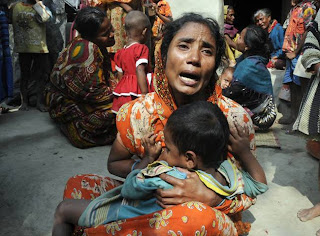18th December, 2011 (12:50AM)
A similarity between prohibition policy and price increase policy to control alcohol consumption is that both encourage bootlegging. Under prohibition, bootlegged liquor is the only means to obtain liquor (unless you have a liquor permit issued by a registered medical practitioner). Under price increase policy, legal liquor is too expensive for the poor people. Due to its relatively low prices, bootlegged liquor is consumed by the poor.
 We all know the potency of bootlegged liquor in impacting hooch deaths. The rich may afford to consume Indian Manufactured Foreign Liquor (IMFL) under prohibition or price increase but the poor who consume unlicensed local brew are always at the risk of hooch deaths. Hooch tragedies are, therefore, mostly confined to the poor people. For eg., the recent hooch tragedy in West Bengal (December 2011), Gujarat's hooch death in 2009, Karnataka in 2008 etc. are confined mostly to the rural poor.
We all know the potency of bootlegged liquor in impacting hooch deaths. The rich may afford to consume Indian Manufactured Foreign Liquor (IMFL) under prohibition or price increase but the poor who consume unlicensed local brew are always at the risk of hooch deaths. Hooch tragedies are, therefore, mostly confined to the poor people. For eg., the recent hooch tragedy in West Bengal (December 2011), Gujarat's hooch death in 2009, Karnataka in 2008 etc. are confined mostly to the rural poor.
It remains a challenge for the government to tackle the black marketing of liquor. In response to the recent hooch tragedy in West Bengal, the Chief Minister of the state, Mamata Banerjee said, "I want to take strong action against those manufacturing and selling illegal liquor."1 prior to this, as a result of the 2009 hooch tragedy in Ahmedabad where 136 people after consuming illicit liquor died and another hundreds were hospitalized, the Gujarat Assembly unanimously passed the Bombay Prohibition (Gujarat Amendment Act) on 28th July, 2009. It provided harsher punishment to those who sell and manufacture illicit liquor.2 The bill was passed unopposed by amending the Bombay Prohibition Act, 1949 (Gujarat Prohibition Act, 2009) in the absence of the Congress which boycotted the Assembly during that time.3 After keeping the bill on hold for more than two years, the Governor of the state, Kamla Beniwal gave her assent in December, 2011. While the old law provided punishment of imprisonment which may extend to one year only and fine to those who illegally manufacture, supply and sell hooch, the new law provided stringent punishments in the form of seven to ten years imprisonment, fine, and death penalty or life imprisonment in case of hooch tragedies.4
Laws, strict laws and still stricter laws! Will all these prevent the illicit market and curb the consumption of hooch? Or would it be a sound policy if:
i) a government repeals prohibition of alcohol?
ii) a government makes legal alcohol affordable?
References:
1. “India toxic alcohol kills 143 in West Bengal,” BBC Mobile (Dec. 15, 2011) http://www.bbc.co.uk/news/world-asia-india-16174531
2. “Gujarat Assembly passes bill proposing death for bootleggers,” People’s Post (Aug. 19, 2009) http://peoples-post.com/nation/state/1040-gujarat-assembly-passes-bill-proposing-death-for-bootleggers.html
3. “Modhi jihad against Cong on hooch bill,” (Dec. 21, 2009) http://currentnews.in/2009/12/21/modi-jihad-against-cong-on-hooch-bill/
4. “Hooch tragedy: Gujarat Governor okays death penalty,” DNA (Dec. 6, 2011) http://www.dnaindia.com/india/report_hooch-tragedy-gujarat-governer-okays-death-penalty_1622133
No comments:
Post a Comment